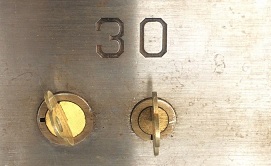It is my best advice that you withdraw all items from your bank safe deposit box.
So, what are some of the risks of placing valuables in a bank-held deposit box?
- States that need money are reducing the time before your items are declared “Abandoned Property,” and confiscated. Financial assets used to be declared abandoned and taken if they weren’t accessed in 10+ years. But as states are more desperate for money, they have been reducing the threshold date. Some states, like California, confiscate in just 3 years and politicians across the country periodically try to reduce the threshold to even a shorter time frame.
2. New bank bail-in laws. Since the 2008 financial crisis, governments around the world have passed and acted on new bail-in laws that include seizing assets held in safe deposit boxes. Then you must prove provenance of how you bought it and paid all applicable taxes before the government will consider giving it back to you. I went through this once with the State of Michigan Treasury. No matter what information I provided, the government replied with additional information requests. They continued asking for additional information until they found something that I could not provide so my request to get my own money back was denied. In my opinion, the “refund process” operated like a scam, they were simply never going to give my money back.
3. The Patriot Act passed in 2001 provides extra-ordinary authority to the U.S. federal government to fight terrorism. Unfortunately, many parts of the Patriot Act are routinely employed for reasons that have nothing to do with terrorism. A federal agent can invoke the Patriot Act, and is then considered by the bank to be an Attorney-in-Fact on your account, and can access your safe deposit box without your permission. In 2002, banks changed their policies to reflect this new authority.
4. A “Banking Holiday” may be declared by the government. In the last 100+ years, anytime there has been a currency devaluation, gold confiscation, or other financial theft by the government, it is performed during a surprise banking holiday where banks are ordered closed. During this period, accounts are frozen, new capital control laws are announced, and only after the damage is done, is access to your accounts (including what may remain of your safety deposit box) given back to you.
5. Liens, lawsuits, and the IRS can all legally access your safe deposit box to satisfy their financial claims against you.
6. Mistakes, accidents, and theft. Nothing in your safe deposit box is insured or inventoried by the bank. So if anything happens, for any reason, you have no legal recourse. Lookup “safe deposit box stolen” and you’ll find countless of stories from across the country of people who claim they were ripped off; only to find they have no legal recourse.
If you have need of a safe deposit box, find a non-bank depository. Most medium or larger cities have private storage facilities and they have far fewer risks than bank safe deposit boxes. There is a reason sales of home safes explode in countries with recent banking problems (Greece, Japan, Cyprus, Germany, Ireland, and others). It is better to protect your valuables early than a minute too late.

